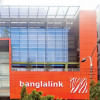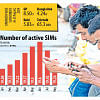Transformative impact of network sharing, digitisation in times of crisis

In times of crisis, effective communication tools become a lifeline for adversely affected communities, where communication stands as the decisive factor between life and death.
In our increasingly interconnected global landscape, telecommunications technology emerges as a key player, facilitating swift disaster management and aiding in the post-disaster recovery process.
Within the context of a disaster-prone country like Bangladesh, we have observed a transformative journey from a nation frequently impacted by disasters to one that now stands resilient in the face of such challenges.
Despite this progress, a 2023 Grantham Research Institute study reveals that the 2022 flood in Bangladesh cost the country $1 billion, impacting over 7.3 million lives.
A global study by the National Bureau of Economic Research indicates that robust telecommunications infrastructure reduces cyclone-related fatalities by an average of 80 percent, underscoring the vital role of telecommunications in disaster response.
Experts suggest that effective use of digital connectivity could reduce casualties and displacements of cyclone victims in Bangladesh by almost 50 percent.
In response, integrating essential services and advanced technology is now imperative, with digital services emerging as crucial tools for mitigating disaster risks and ensuring effective post-disaster management.
With smartphone penetration rapidly approaching nearly 50 percent of the population in Bangladesh, telecommunications and digital services play a dual role, both in creating mass awareness before calamities and in facilitating mitigation and management efforts afterward.
A notable example of such a role can be observed in Indian telecom sector.
India has implemented measures to bolster communication networks during disasters. Telecom providers are now required to share networks, issue public alerts, and permit intra-circle roaming for 15 days in affected districts.
This policy aims to ensure uninterrupted and affordable communication services, aiding both affected individuals and enhancing coordination among authorities and relief agencies.
Another example is the recent Russia-Ukraine conflict that prompted mobile telecom operators to actively share networks, ensuring seamless connectivity nationwide during times of distress.
A comparable case can be advocated in Bangladesh, where the population is 3.7 times larger than Ukraine and covers land that is 4 times more widespread.
Therefore, sharing networks among mobile operators, especially during national emergencies and crises, would be a game-changing strategy in pre-, post-, and early-disaster management.
Building on the insights provided in the same study, a projected 36 percent increase in flooding and cyclone risks emphasises the importance of preventive measures.
In Bangladesh, where almost 60 percent of the population faces a significant risk of flooding – a figure surpassing that of any other country globally, except for the Netherlands – and about 45 percent are exposed to a high risk of fluvial flooding, the highest proportion worldwide, these findings are particularly pressing.
In response to these alarming statistics, Banglalink took proactive steps by introducing a live cyclone tracker within the MyBL app during cyclone 'Mocha'.
Accessible to users from any network, this digital resource enabled smartphone users to track their location in relation to the cyclone's path,resulting in over 10 million people effectively safeguarding not only their lives but also those of the people around them.
The MyBL Early Warning System relies on real-time data from government sources and third-party sites, aiding users in tracking cyclones, finding government shelters, and addressing power-related issues caused by the disasters.
With a monthly active user base of 7.5 million, this feature ensures instant updates for a large number of people. This is a classic example of how digitisation can help lives.
Bangladesh requires immediate action and resilient measures to fight the severe climate risks and digital service providers play a crucial role here.
With government support, the telecom industry can strengthen disaster management further, contributing to the country's growth potential.
Banglalink's recent recognition at the 'Bangladesh Sustainability Excellence Awards 2023' reaffirms the significance of the telecom company's innovative approach, motivating us to take advanced disaster management initiatives.
As Bangladesh forges ahead on its rapid journey of growth as a nation, ensuring the well-being and safety of its people becomes pivotal for the advancement of industries and service providers.
Within this trajectory of growth, the telecommunications and digital services sector emerges as a key growth partner, contributing significantly to the country's accomplishments in disaster management through digital transformation for a sustainable and resilient future charting the path towards a Smart Bangladesh.
The proposal for sharing network for disaster management could also be very important in reducing import of equipment by the mobile network operators as through active sharing the operators can import one equipment, share with each other and save millions of dollars for the country.
The writer is the chief corporate and regulatory affairs officer at Banglalink.

 For all latest news, follow The Daily Star's Google News channel.
For all latest news, follow The Daily Star's Google News channel. 








Comments